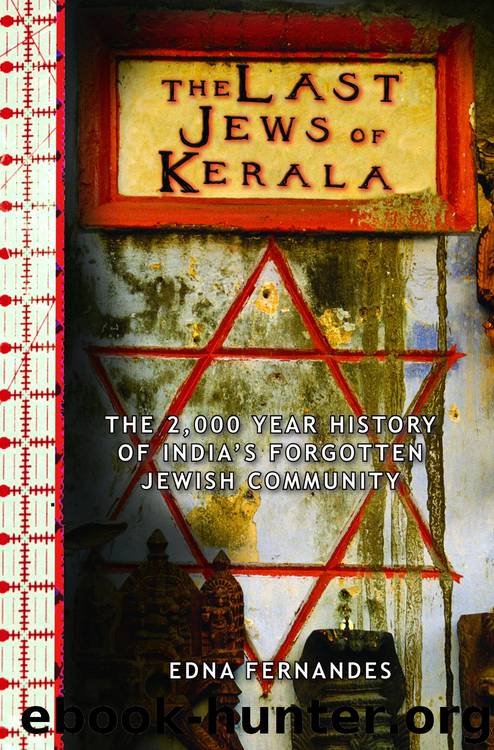Last Jews Of Kerala, The by Edna Fernandes

Author:Edna Fernandes
Language: eng
Format: epub, mobi
Publisher: Skyhorse Publishing
Published: 2011-01-16T16:00:00+00:00
The raj proved pivotal in the fortunes of all the Jews of India. The rise of Bombay under the British led to Cochin’s eventual demise as the premier trading port of the west coast, which in turn impacted on the fortunes of the Jews there. In Bombay itself, the transformation taking place as a result of British trading led to the Bene Israel people migrating from village to city and tying their fortunes with the raj. In the case of the Baghdadi Jews of Bombay and Calcutta, they came to India from the Persian Gulf port of Basra which was another outpost of the British Empire around 1760. At this point, Jews involved in trade with India arrived from Basra and Baghdad, at first settling on the western coast of India. A community of one hundred Jews came from this part of the world to Surat, forming an Arabic speaking Jewish colony. These merchants were named Baghdadi or Iraqi Jews and in time others from Syria, Persia and Afghanistan joined them. Surat declined, leading important Jewish families such as the Sassoons, Abrahams, Ezras and Kadouries to move towards the new British-ruled commercial hubs of Bombay and Calcutta. Fortunes were made through trade in cotton, jute, tobacco and opium.
Within a century of their move to India the Arabic-speaking Jewish community numbered almost thirty families and the center of their religious life was a house rented from Parsis, who hailed originally from Persia. Thus, the old world and new conspired to survive.
The most famous of the Baghdadi Jews, whose name resonates in India to this day, is David Sassoon. He arrived in Bombay in 1833, the ancestor of the chief treasurer to the governor of Baghdad. He forged his own legacy in India as the head of a trading dynasty which would eventually stretch from Calcutta and Bombay to Shanghai and Singapore. He also became a renowned philanthropist which together with his commercial pedigree earned him the appellation of “the Rothschild of the East.”
Among his charitable activities was the building of the Magen David synagogue in Bombay in 1861, which included a religious school and hostel. Thanks to his company, Jews from across India found jobs in the Sassoon factories in Bombay. His corporate ethos was based on patrician values: he took it upon himself to provide food and accommodation for Jews arriving in the city, as well as arranging medical care and schooling for the children. The schools even taught ritual slaughter to ensure that families who were posted to remote areas far from other Jews could maintain their religious practices.
Sassoon’s contribution to Bombay life was acknowledged beyond his own people. On his death in 1864, the Times of India wrote that “Bombay has lost one of its most energetic, wealthy, public spirited and benevolent citizens . . .”
His successors continued his work of building a textile empire and also endowed charities, schools and built cemeteries for the Baghdadi Jews of Bombay. The second largest group of Baghdadi Jews settled in Calcutta, which was India’s eastern trading port.
Download
This site does not store any files on its server. We only index and link to content provided by other sites. Please contact the content providers to delete copyright contents if any and email us, we'll remove relevant links or contents immediately.
Autoboyography by Christina Lauren(4683)
Asking the Right Questions: A Guide to Critical Thinking by M. Neil Browne & Stuart M. Keeley(4599)
Dialogue by Robert McKee(3592)
Eat That Frog! by Brian Tracy(3525)
Sticky Fingers by Joe Hagan(3456)
Journeys Out of the Body by Robert Monroe(2997)
Elements of Style 2017 by Richard De A'Morelli(2946)
Annapurna by Maurice Herzog(2846)
Schaum's Quick Guide to Writing Great Short Stories by Margaret Lucke(2808)
Full Circle by Michael Palin(2780)
The Diviners by Libba Bray(2447)
The Art of Dramatic Writing: Its Basis in the Creative Interpretation of Human Motives by Egri Lajos(2416)
The Mental Game of Writing: How to Overcome Obstacles, Stay Creative and Productive, and Free Your Mind for Success by James Scott Bell(2398)
Why I Write by George Orwell(2362)
Atlas Obscura by Joshua Foer(2351)
In Patagonia by Bruce Chatwin(2275)
The Fight by Norman Mailer(2160)
The Elements of Style by William Strunk and E. B. White(2077)
Venice by Jan Morris(2055)
